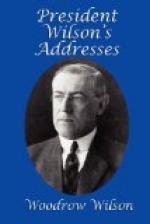MR. SECRETARY:
I know that the feelings which characterize all who stand about me and the whole Nation at this hour are not feelings which can be suitably expressed in terms of attempted oratory or eloquence. They are things too deep for ordinary speech. For my own part, I have a singular mixture of feelings. The feeling that is uppermost is one of profound grief that these lads should have had to go to their death; and yet there is mixed with that grief a profound pride that they should have gone as they did, and, if I may say it out of my heart, a touch of envy of those who were permitted so quietly, so nobly, to do their duty. Have you thought of it, men? Here is the roster of the Navy—the list of the men, officers and enlisted men and marines—and suddenly there swim nineteen stars out of the list—men who have suddenly been lifted into a firmament of memory where we shall always see their names shine, not because they called upon us to admire them, but because they served us, without asking any questions and in the performance of a duty which is laid upon us as well as upon them.
Duty is not an uncommon thing, gentlemen. Men are performing it in the ordinary walks of life all around us all the time, and they are making great sacrifices to perform it. What gives men like these peculiar distinction is not merely that they did their duty, but that their duty had nothing to do with them or their own personal and peculiar interests. They did not give their lives for themselves. They gave their lives for us, because we called upon them as a Nation to perform an unexpected duty. That is the way in which men grow distinguished, and that is the only way, by serving somebody else than themselves. And what greater thing could you serve than a Nation such as this we love and are proud of? Are you sorry for these lads? Are you sorry for the way they will be remembered? Does it not quicken your pulses to think of the list of them? I hope to God none of you may join the list, but if you do you will join an immortal company.
So, while we are profoundly sorrowful, and while there goes out of our hearts a very deep and affectionate sympathy for the friends and relatives of these lads who for the rest of their lives shall mourn them, though with a touch of pride, we know why we do not go away from this occasion cast down, but with our heads lifted and our eyes on the future of this country, with absolute confidence of how it will be worked out. Not only upon the mere vague future of this country, but upon the immediate future. We have gone down to Mexico to serve mankind if we can find out the way. We do not want to fight the Mexicans. We want to serve the Mexicans if we can, because we know how we would like to be free, and how we would like to be served if there were friends standing by in such case ready to serve us. A war of aggression is not a war in which it is a proud thing to die, but a war of service is a thing in which it is a proud thing to die.




